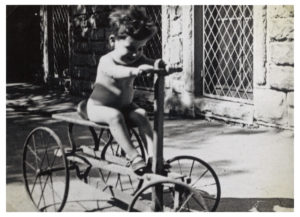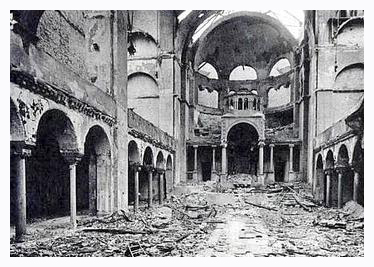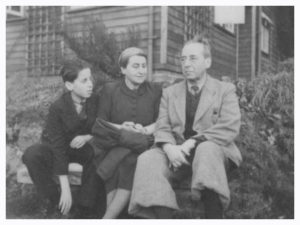Frank’s Youth: Journey from Stuttgart to Brookline

Frank E. A. Sander was born July 22, 1927 on 19 Johannesberg Strasse in Stuttgart Germany. Frank was the third child for Alice (born Alice Epstein December 24, 1889-1978) and Rudolf (born Rudolf Levi October 23, 1880–1966). Frank had an older sister Dora (1919-2014) who was nearly 10 and a brother Lothar (1922-2007) who was 5 when Frank arrived.
Frank’s early childhood was filled with music. The family often played together (with Lothar on violin, Alice on piano, and Frank on recorder). Frank’s early memories included weekend picnics and hikes in the Black forest, a delicious neighborhood bakery which sold ice cream in the summer, amazing meals, a wonderful school Schieker Schule, and much bike riding. Many of the early pictures of Frank show him reading and playing the recorder. There were many family members nearby. Rudolf’s parents (Helene—born January 23, 1856 and Uri—born May 18, 1844) lived at 15 Garten Strasse. Alice’s parents (Clara Hess and Victor Epstein) lived at 50 Hoelderlin Strasse and Uncle Emil had a beautiful home on the outskirts of town on Eduard Pfieffer Strasse. Emil had a baritone voice and would often sing Schubert lieder in the evening.
When Hitler came to power all of this would change.

Frank’s uncle Ernest liquidated his banking firm in Berlin and moved to England forfeiting 75% of the bank’s value and started a new financial firm in London. Uli, Frank’s cousin, was forced to drop out of Tubingen University and, while Rudolf (Frank’s father) was able to continue running his printing press for a few years, it soon became clear that life in Germany was no longer safe. Frank’s parents resisted leaving (Germany was the only home they had known) until 1938 when in November Nazis destroyed Jewish stores and rounded up many Jewish men in a night later known as Kristallnacht (Night of Broken Glass). Rudolf, Frank’s father, was seized and taken to an internment camp near Ludwigsburg (an hour from Stuttgart). This event made it clear that leaving was essential. In 1938 German passports of Jews were confiscated, Jewish lawyers and doctors were banned from working, and the synagogue in Stuttgart was burnt and destroyed.
Frank’s sister, Dora, had already gone to England in 1937 and worked for Sir Alexander Russell a Member of Parliament tutoring his children in German. With Sir Russell’s help and the pledge of Frank’s uncle Ernest, Dora was able to get the necessary visa and papers for the family to emigrate to England. The papers came from Sir Samuel Hoare (then Home Secretary in England responsible for immigration). On October 12th 1938 Frank was put on a kindertransport train alone at the age of 11 knowing no English other than Brer Rabbit that his nurse had read him and was sent to England. Frank was sent to a Catholic school St Mary’s Lodge in Bournemouth England—where he started the task of learning English and struggled to fit in during a time when Germans were taunted and mocked.
Frank’s brother (Lothar) and paternal grandmother (Helene) left on an earlier train bound for England with 10 marks each as their only currency. In February of 1939 Frank’s mother Alice managed to get Rudolf out of prison camp and they both left everything they owned behind, each taking only one suitcase and 10 marks as they headed to England.

Frank’s parents found a place to live and work from February 1939 to October 1940 in the Sunfield Children’s Home in Clent Worcestershire, a residential school for disabled children northwest of London, with Rudolf working in the garden and Alice helping with cooking and gardening. However, as WWII broke out Lothar (Frank’s brother) found himself interned in Canada and Rudolf was briefly interned in the west of England. Frank’s sister, Dora, made her way in 1939 to the U.S. and in September began a scholarship at Radcliffe University.
While much of the family escaped, not all were so lucky. Frank’s maternal grandfather Viktor was taken from his home on Johannes Strasse and died at Treblinka concentration camp on September 23, 1942. All possessions and most family photos were left behind in Stuttgart and it was many years before family members were able to return.
Dora, began the process of trying to get permits for her family to come to the U.S. This required getting placed on a quota list for immigration and having a cousin of Ernest’s wife, Marian, vouch that “Neither Mr Sander nor his family will never be permitted by me to become public charges. I am amply able to provide for their support should this ever become necessary.” Eric Warburg was the U.S. cousin kind enough to make this notarized guarantee.

In 1940 when their quota came up, Frank, Alice and Rudolf took one of the last passenger lines from England to New York. Rudolf was 60, Alice was 51 and Frank was 13. On arrival they stayed one week in New York with Alice’s brother and then Dora arranged to have the family moved via the International Refugee Center to live with a family in Belmont, Mass. where they stayed for a year. Alice took up infant nursing, and Frank was placed in the home of one of Dora’s friends in Roxbury. Frank and his family emigrated with the help of overseas relatives willing to assist with their resources. Many German Jewish families were not as lucky as the financial and logistical hurdles to leave Germany were high.
Frank attended Boston Latin School for one year and then graduated from Brookline High School in 1944. To improve his English Frank kept a notebook of every word that he heard that he didn’t know, a list which he maintained all his life. Rudolf and Alice moved into a two bedroom apartment at 150 Amory Street in Brookline and served as a foster parents to a disabled girl. In 1943 Dora earned a full scholarship at Radcliffe College for Jewish Refugees and completed a bachelor’s degree magna cum laude in American government.
In 1944 Frank applied to Harvard College and was originally rejected due to an unofficial quota on Jews–so the family believes. However, Harvard may have underestimated the power of maternal love. Alice, Frank’s mother, went to the Admissions Office to make clear that Frank was a boy of great character and intellect and to help them to see that they had made a “big mistake.” Whether it was due to this or something else unknown to the family, Frank was admitted to Harvard College that Fall.
Frank attended Harvard from 1944-1949
majoring in Mathematics, with a thesis that focused on twin prime numbers. (https://en.wikipedia.org/wiki/Twin_prime )Frank lived in Standish Hall (part of Winthrop House) and later in Adams House. He played flute in the Harvard Band and received his degree magna cum laude and was elected to Phi Beta Kappa. While Frank was very talented musically and academically, sports came less easily and part of the family folk lore is that Frank almost didn’t graduate Harvard because of the mandatory swimming test. In 1946 both Frank’s parents became citizens of the U.S. and in March 22, 1948 Frank was naturalized.
Frank briefly worked at John Hancock Insurance one summer and took actuarial exams thinking he might become an accountant or get a math Ph.D. but his sister, Dora, enrolled in law school at the time, told Frank he would like the law and “might be good at it.” In 1949 Frank was drafted into the Army. He underwent basic training at Fort Dix, New Jersey and later was accepted into the U.S. Army Band at West Point, having taught himself piccolo. Frank’s mother once captioned a photo, “Frank did not like the Army way, but never mind they made him stay.”
In 1949 Frank was accepted into Harvard Law School (HLS) where he faced challenges and prevailed. Frank was not only selected for Law Review (an honor only available to the top 25 students in year one and another 10 students in the second year) but also served as its treasurer . Frank was ranked 13th in his class and was in the last class at Harvard Law School that had no females (women were admitted in Frank’s second year). Harvard Law School still had Saturday classes. During law school, Frank was President of the Harvard Orchestra where he played the flute. He lived in Adams House where he served as tutor and librarian. During the summers, Frank worked at Tanglewood and did tax work under the supervision of Harvard Law School Dean Erwin Griswold for the American Chicle Company.
Harvard Law School in these Paper Chase days did not have entry exams but weeded people out with a rigorous first year. HLS professors would say “look to the left of you. Look to the right. One of the three of you won’t be here at the end of this year.” Frank still recalled many decades later a particularly traumatic second year experience in Austin Scott’s Trusts class:
“I had been up most of the night editing a piece for the Law Review and unfortunately had a seat way down in the front. Since Professor Scott was nearsighted, he always looked in the front row and called people there. He was not a mean teacher, he was a very warm gentleman, but he called on me and I said ‘I am not prepared’ because I hadn’t read the case and was barely awake. And he said ‘well it’s only a very short case. Why don’t you read it now? We’ll all wait for you.’ So here is this whole room of students waiting for me to read. It was one of those early trust cases maybe from 1300 or 1400, written in old English.”
In spite of these challenges Frank enjoyed law school and earned his L.L.B. degree magna cum laude in 1952.
